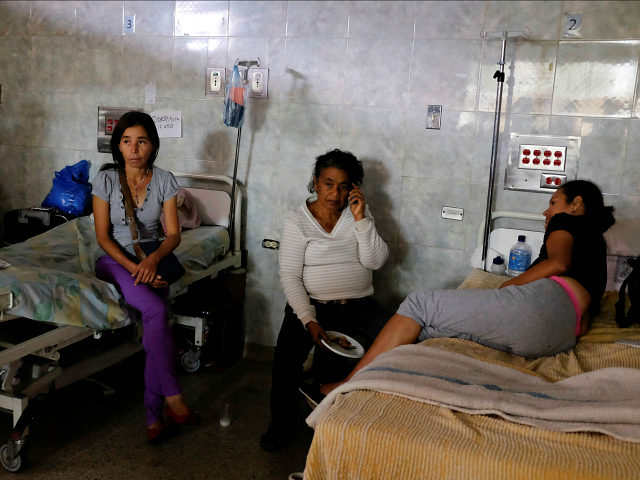Venezuelan dictator Nicolás Maduro has demanded the United Nations deliver humanitarian aid in the form of medical supplies, which pharmaceutical leaders in the country have spent over a year warning are in short supply.
Maduro issued the plea on national television Friday, blaming the medicine shortage plaguing Venezuela’s hospitals and pharmacies on the “economic war,” a term the socialist Venezuelan government has used for years to refer to economic sanctions, particularly from the United States, placed on the country for its leaders’ ties to international drug trafficking and terrorist organizations.
“The United Nations has the most advanced and complete plans in the world to recover the pharmaceutical industry’s production capacity and direct it toward medicines for the people,” Maduro told his audience, urging the UN to act. To his viewers, he said, “I trust in you to keep advancing the strengthening of… the productive engines of the Bolivarian economic agenda.”
While asking for humanitarian aid – aid Maduro has claimed for months his country did not need – Maduro also claimed that Venezuela is “among the nations with high human development indices” and praised the socialist “resistance” for “protecting our people.” CNN notes that Maduro did not specify what sort of medical aid he sought for his country upon meeting with an official from the UN’s Development Program in Latin America and the Caribbean.
Of the 150 medicines the World Health Organization (WHO) considers essential for sustaining a healthy society, Venezuela is chronically lacking 85 percent of them, according to the Venezuelan Pharmaceutical Federation (Fefarven). The Venezuela professor and physician Omar Arias also estimates that over 80 percent of the nation’s government-owned medical imaging technology is inoperable due to a lack of resources for repairing them when they break.
As a result, the number of amputations of infected limbs – incurable without antibiotics – began skyrocketing in 2014. Mastectomies, due to lack of cancer medications, have also increased in number. HIV and teen pregnancy rates are also on the rise due to a complete lack of contraceptives.
Venezuela imports 95 percent of its medical supplies, leaving the country at the whim of its spiraling hyperinflation, which has made importing food, medicine, oil, paper, and other necessary goods increasingly difficult. Venezuela is facing a 500 percent inflation rate and, according to CNN, may see that rate rise to 1660 percent by the end of 2017.
Freddy Ceballos, the head of Fefarven, warned this week that only half of Venezuela’s pharmaceutical factories are currently operational, adding to the pressure to import drugs. Ceballos had warned in January 2016 that the nation was facing a “humanitarian crisis,” as antibiotics, painkillers, birth control, and more complex cancer and HIV drugs had become nearly impossible to find stocked in local markets. At the time, Ceballos called for Maduro to “activate all mechanisms of international health assistance to solve this crisis as soon as possible.”
Over a year later, Maduro appears to be taking that advice, but not before handing the nation’s limited medical supply over to the military to be monitored and adequately distributed. Venezuelan Minister of Defense Vladimir Padrino López announced last year that the military would control the distribution of all such supplies “to guarantee that these medicines and supplies get to the patient efficiently and are neatly distributed and assigned.”
Instead, Venezuela is suffering an even more severe medical shortage and opposition leaders and humanitarian workers are demanding that, should the United Nations respond to Maduro’s request, the medicine be distributed fairly and not through a socialist government mechanism.
The independent Coalition of Organizations for Health and Life Rights (Codevida) has specifically demanded Maduro not hand the medicine over to Socialist Party (PSUV) operatives, as he has done with the nation’s food supply. “We hope that the government will not distribute medicine through the CLAP,” requested Codevida’s Francisco Valencia this week, referring to the Local Committees for Supply and Production which now control local food supplies. As they are PSUV operatives, CLAP leaders have the power to deny political dissidents food unless they cooperate with the government.
It remains uncertain why Maduro chose this particular moment to involve and international entity. The Venezuelan journalist Juan Francisco Alonso told Deutsche Welle that there was “no explanation whatsoever” for the move but estimated that four million Venezuelans are at risk of death due to a lack of medications: “200,000 people with high blood pressure, a similar number of patients with cancer and HIV, and so on.” What’s more, Venezuela has lost an estimated 19,000 doctors, who left the country fleeing socialism, and has run out of oil to use to buy Cuban doctors, as it has done for years.
Venezuela’s doctors earned an average of $2.20 a day in mid-2016.

COMMENTS
Please let us know if you're having issues with commenting.